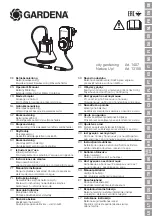
WARNING: WHILE PRESSURIZING, IF YOU HEAR A HISSING NOISE, STOP
PRESSURIZATION. WHILE PRESSURIZING, IF THE GUAGE NEEDLE DOES NOT
MOVE, STOP PRESSURIZATION. To stop pressurization of the MK-60, turn black knob
above the regulator perpendicular to the valve.
10.
Mark refill date and expiration date of the OC formulation on the side of the canister. The
expiration date is listed on the MK-60 refill jug. The MK-60 canister must be hydrostatic tested 5
years from the date on the top of the canister*
11.
Close the Velcro pouch around the nitrogen cartridge, regulator and hose.
* The stamped numbers on the top of the cylinder represent the following: 1
st
stamp - DOT-3AL2015 –
DOT specification and service pressure rating (2015 PSI); 2
nd
stamp – AAXXXXXX – Serial number;
3
rd
stamp – M5659 – DOT registration number for producing facility; 4
th
stamp – 12^10 – Manufacture
date MM/YY; 5
th
stamp – TC-3ALM139 – TransCanada specification. The MK-60 cylinder needs to
be hydrostatic tested 5 years from the date of manufacture indicated in the 4
th
stamp.
4.
Replace O-ring on the male end of the valve neck and
place valve neck back onto canister and hand tighten.
Be sure to tighten firmly. (
NOTE:
if filling new
hardware for the first time, the valve will already be
equipped with an O-Ring.)
5.
Open Velcro pouch on bottom of MK-60 holder.
If an empty nitrogen cartridge is screwed into the
regulator, remove the cylinder by unscrewing it.
6.
Turn the black knob above the regulator
perpendicular to the valve. This closes the flow
of pressure from the regulator to the unit.
8.
Turn the black knob above the regulator parallel to the valve.
This will allow the nitrogen to pressurize the MK-60 canister.
The nitrogen cartridge must remain in the regulator during use.
DO NOT REMOVE THE NITROGEN CARTRIDGE FROM
THE REGULATOR UNTIL THE UNIT IS EMPTY.
9.
If the canister is accidentally over pressurized,
depress the valve lever/trigger while holding the
canister in an inverted position to relieve the excess
pressure.
7.
Screw a new nitrogen cartridge into the pressure regulator
attached to the hose. When you puncture the seal, you
will hear a hissing noise. Continue to screw in the
cylinder until it is tight and there is no hissing noise.




















